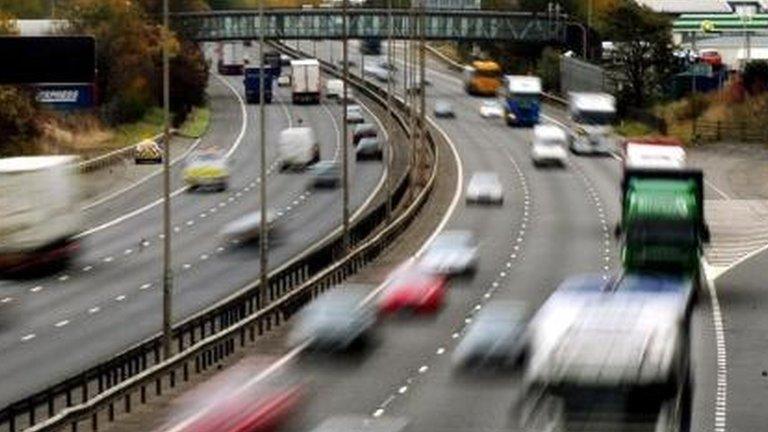Alan Shatter's troubled tenure
- Published
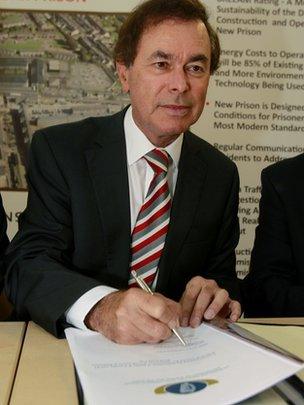
Justice Minister Alan Shatter has held his post for three years
During his three years as Irish Justice Minister Alan Shatter was never far from controversy.
Two bugging scandals, a very bitter row over drivers' penalty points and his failure to complete a breathalyser test at a police checkpoint have kept him in the headlines.
But they are just some of the disputes he was involved in.
The minister came to power with the Fine Gael/Labour coalition in February 2011, four months after the Republic of Ireland was forced to accept a humiliating international financial bail-out.
Mr Shatter, a lawyer, was put in charge of two government departments - justice and defence.
'Shattergate'
As the Republic of Ireland introduced painful austerity measures, the new justice minister set out on a wide-ranging reform agenda, which included plans to close more than 100 police stations.
But, in May 2013, the justice minister became embroiled in a public row that generated so much attention it became popularly known as Shattergate.
The minister was taking part in a TV debate about alleged police corruption in the penalty points system, following claims officers inappropriately wiped points from the driving licences of often well-connected offenders.
His opponent in the debate was the independent parliamentarian Mick Wallace who had made claims that sports stars, journalists and others appeared to have their driving penalties waived.
Mr Shatter accused his opponent of hypocrisy. He informed viewers that Mr Wallace had himself benefited from police discretion on a penalty points offence, having been observed using his mobile phone at a set of traffic lights in Dublin.
There was no formal reprimand or police record of the event, so Mr Wallace wanted to know how the minister could have known about it.
Mr Shatter said his information source was the then police chief, Martin Callinan, resulting in more questions over the minister's close working relationship with the country's top police officer - not for the first nor last time.
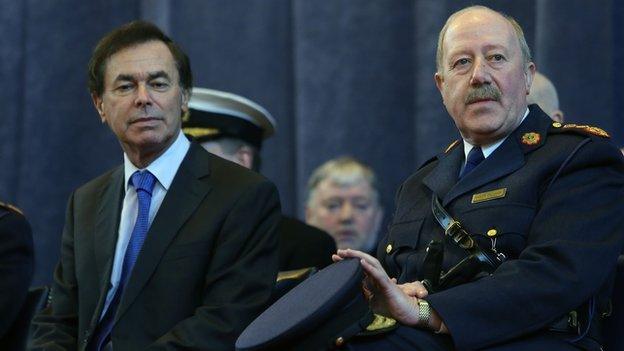
Alan Shatter has come under increasing pressure following last week's resignation of the former Garda Commissioner Martin Callinan (right)
Within days, the justice minister faced questions in parliament about claims he had once failed to provide an alcohol breath test at a police road checkpoint in Dublin.
In a written statement, Mr Shatter replied that he failed to complete the breathalyser test because of his asthmatic condition and was waved on by officers.
Confidence vote
He denied he had taken alcohol before getting into his car and said he was returning home from the Irish parliament.
Under Irish law, elected members going about parliamentary business cannot be arrested.
However, Mr Shatter was then accused of abusing parliamentary privilege in refusing to submit to the breath test.
The country's main opposition party, Fianna Fáil, tabled a motion of no confidence in the justice minister, but it was defeated on 29 May 2013.
In December 2013, Mr Shatter issued an unreserved apology on behalf of the state after a major public inquiry found that Irish police officers had colluded in the IRA murders of two senior Northern Ireland policemen in 1989.
The Smithwick Tribunal investigated allegations of collusion by the country's police force, An Garda Síochána, in the killings of Royal Ulster Constabulary officers, Supt Bob Buchanan and Ch Supt Harry Breen.
Political interference
The RUC officers were shot dead by the IRA as they returned from a meeting at Dundalk Garda station.
The tribunal, and indeed the murders, had preceded Mr Shatter's tenure as justice minister by many years, but he was still caught up in controversy.
In June 2011, tribunal chairman Judge Peter Smithwick accused the minister of trying to interfere with the independence of the public inquiry.
The judge, opposition politicians and unionist representatives at Stormont objected to Mr Shatter's attempt to impose deadlines on the only Troubles-related public inquiry to take place in the Republic of Ireland.
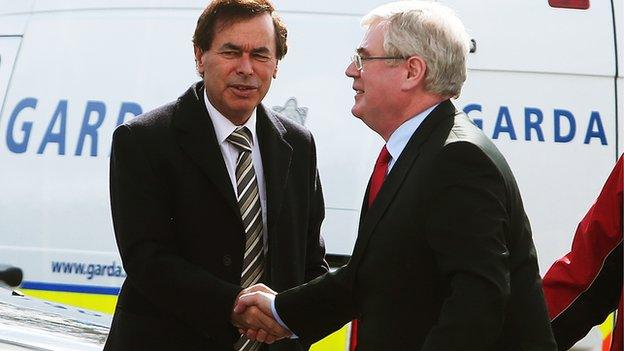
Alan Shatter's Fine Gael party is in coalition government with Eamon Gilmore's Labour party
The justice minister has also had a tense relationship with the Garda Representative Association (GRA), which represents rank and file police officers.
In 2013, the GRA passed a motion of no confidence in Mr Shatter and refused to invite him to address its annual conference.
It was the first time in the GRA's history that the organisation snubbed an Irish justice minister in such a way.
Surveillance
Over recent months, Mr Shatter has been heavily criticised for his handling of claims that the office of the Irish police watchdog may have been bugged.
A security sweep of the Garda Síochána Ombudsman Commission's (GSOC) offices suggested evidence of electronic surveillance in a meeting room and a compromised wi-fi system.
The sweep was carried out last year, but details emerged months later in a Sunday Times newspaper report.
It also emerged that GSOC had not informed either the police or the justice minister about the findings of the security operation.
Mr Shatter publicly criticised the ombudsman for not informing him, but the opposition accused the minister of treating GSOC as the villain, not the victim, of the bugging controversy.
Meanwhile, the actions of two police whistleblowers, who made allegations that there was widespread abuse of the penalty points system, were described as "disgusting" by Garda Commissioner Martin Callinan.
Resignation
When an independent report largely vindicated the whistleblowers, there were calls for the police chief to retract his "disgusting" remarks.
Mr Callinan refused to back down and weathered the criticism for three months. But on 25 March, he resigned unexpectedly.
Within hours, the timing of his resignation became clear as a new controversy engulfed both the police and the department of justice.
The government announced it was setting up an inquiry into revelations that telephone calls to and from many police stations had been secretly recorded, without the knowledge of either officers or callers.
It later emerged there were about 2,500 secret tapes still in existence, some dating from as far back as the 1980s.
Witnesses in criminal investigations are among those whose conversations were secretly recorded and the revelations could have major implications for current and completed court cases.
Opposition politicians repeated their calls for Mr Shatter to step down, but on 2 April, a second motion of no confidence was defeated in parliament by 95 votes to 51.
This week, the penalty points row and the Garda whistleblowers controversy came back to bite the minister.
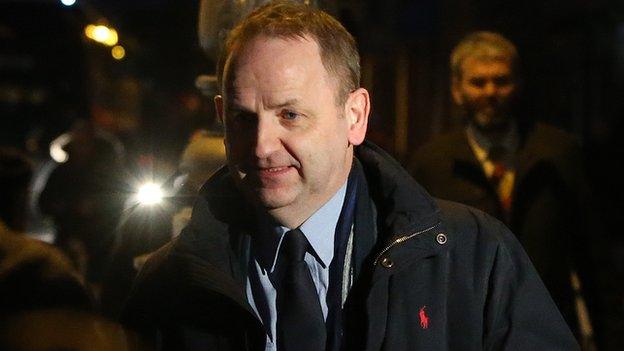
Mr Shatter's downfall came after a report criticised his handling of allegations made by Garda whistleblower Sgt Maurice McCabe
On Tuesday, Data Protection Commissioner Billy Hawkes ruled that Mr Shatter had broken data protection laws during his TV spat with Mick Wallace.
The commissioner ruled the minister should not have disclosed personal information about Mr Wallace, namely telling viewers that the independent TD had been cautioned by police for using his mobile phone while driving.
But it was Mr Shatter's handling of the whistleblowers' case that finally caused his downfall.
On Wednesday, Taoiseach Enda Kenny told a stunned parliament that Mr Shatter had resigned following the government's receipt of a report into allegations made by Sgt Maurice McCabe.
Mr Kenny said his colleague had taken responsibility after the report criticised a number of agencies, including the police, the Department of Justice and the minister himself.
However, the man who has been dubbed the "minister for self-defence" did not leave without a parting shot.
In his resignation letter, Mr Shatter said he disputed some aspects of the report. He added that he "would have expected" the author Sean Guerin SC to interview him before reaching a conclusion.
The whistleblowers' report is due to be published on Friday.
- Published8 May 2014

- Published7 May 2014
.jpg)
- Published26 March 2014
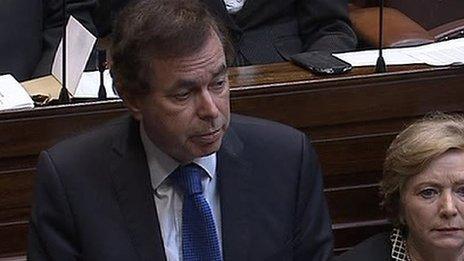
- Published25 March 2014
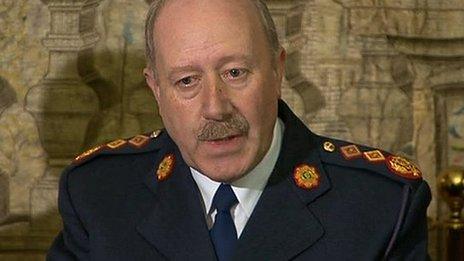
- Published21 March 2014
